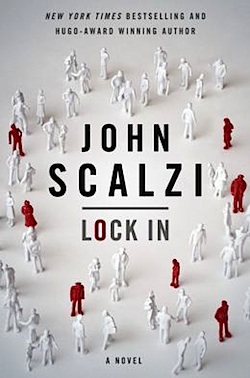You know who’s going to love Lock In? John Scalzi fans. If you fit into that category, stop reading and just go buy the book. Read this article later. If, like me, your relationship with John Scalzi is complicated, keep reading.
Once, I loved Scalzi’s work. I found it witty and charming, with a perfect blend of action, humor, and drama. Once, I found his work indulgent and repetitive, with an overreliance on one voice and one perspective to carry the day. In both instances I was convinced I knew who John Scalzi was as a writer.
With Lock In, it’s time to reevaluate again.
In the exceedingly near future, a virus sweeps the globe, killing some, ignoring most, and for about 1% of the population destroying the neural connections between body and brain. These few are fully aware, but cannot move or respond to stimuli. They are “locked in,” suffering from what’s known as Haden’s Syndrome. Knowing America like he does, Scalzi posits a response to the crisis that involves billions of research dollars and technology development to create a new way of life for the Hadens, as they’re called. The result is a massive government supported cottage industry built around this new afflicted population.
Set in Washington DC, Lock In tells the story of Chris Shane, a rookie FBI agent, who happens to be from a political superfamily and, thus, one of the most famous Hadens on Earth. Partnered with Leslie Vann, a somewhat down on her luck Bureau veteran, the pair are tasked with solving a Haden-related murder. The trick is the killer isn’t a Haden, but an Integrator, a person possessing rare brain chemistry that can allow a Haden to take control. While the narrative is a simple whodunit structure, the mechanisms of the world create interesting twists.
Hadens due to their condition cannot interact with the world around them, but their minds can, assuming they’re given the proper technology to do so. The first is the Agora, a virtual reality environment not dissimilar from Ernie Cline’s OASIS in Ready Player One or Hannu Rajaniemi’s spimescapes in The Quantum Thief. Through the Agora, Hadens interact with one another and can manipulate robots, called Threeps (for Threepio), as proxies within the real world. The second, as mentioned above are Integrators, who are licensed and bonded sentient receptacles of Hadens’ consciousnesses. How all of this complicates a murder investigation is the fun part, but Scalzi also injects no shortage of prejudice, political intrigue, and explodey bits to further muddy the waters. Billions of dollars of government funding don’t last forever you see.
As familiar as I am with Scalzi’s work, having read nearly everything not called The Human Division, I know what he sounds like. And frankly, in recent years the voice from his Whatever blog merged with the voice of his protagonists into Scalzi doing Scalzi. Redshirts and Fuzzy Nation were like Robert DeNiro in Meet the Parents (2000) and Analyse This (1999), an actor playing a caricature of himself. It was still entertaining in the way that a good sitcom never gets old, but it failed to capture anything like the sense of discovery I experienced the first time I read Old Man’s War or Agent to the Stars. Lock In, in contrast, feels very much like a writer trying to do something different.
What’s different about it? Well, for one it puts plot first. It’s not to say that the characters aren’t well developed, but, unlike some of his previous works, the things that happen have more external value than they have in the past. While I vaguely remember the plots of Scalzi’s more character or voice driven works, I am more often left with the sardonic wit or one-liners that illuminate his characters than I am with a particularly major twist. Two, Scalzi gets out of his own way, decreasing the amount of clever and increasing the amount of genuine dialogue. The result is a narrative experience that isn’t clubbing you over the head with its sentence by sentence LOOK AT ME mentality. Instead, it’s clubbing you over the head with fun, and intrigue, and a compelling narcotic craving desire to keep reading.
Throughout his career I’ve considered John Scalzi the heir apparent to a host of writers. Joe Haldeman. Christopher Moore. Lois McMaster Bujold. The science fictional Steven Brust. At various times he’s been all of these things and, sometimes, none of them. Now though, I see him on a different path, one that leads away from the often isolated and entrenched science fictional genre and into a realm occupied by the likes of Neal Stephenson. John Scalzi is now, more than anything else, the heir apparent to Michael Crichton. A funny Michael Crichton to be sure, but still very much a purveyor of science fiction as enthralling to the fan as it is to the casual consumer.
Lock In is science fiction for the masses. Count me as one of them.
Lock In is available now from Tor Books.
Read the first five chapters for free here on Tor.com, and listen to audiobook selections narrated by Amber Benson and Wil Wheaton.
Justin Landon runs Staffer’s Book Review where his posts are less on-color. Find him on Twitter for meanderings on science fiction and fantasy, and to argue with him about whatever you just read.










